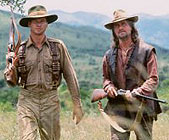|
|
|
|
The
Ghost and The Darkness
|
 |
|
Surely the adventure epic set in exotic lands is the creakiest and most old-fashioned of all popular genres. The noble white hunter in a savage wilderness, fighting nature and building civilisation while, all around him, painted tribes beat drums and chant fiercely ... How on earth could anyone get this formula to work today? The Ghost and The Darkness makes a decent stab at resuscitating the action-adventure form. It sets its pitch somewhere between a ponderous David Lean epic, a swift Indiana Jones escapade, and a freaky horror movie. The on-screen and off-screen personnel reflect this patchwork approach: a script by respected veteran William Goldman is handled by young Australian expatriate Stephen Hopkins, a genre specialist; while grave British and Indian character actors share the frame with a hammy Michael Douglas and a soulful Val Kilmer. Patterson (Kilmer), employed by a nasty white imperialist, is given the difficult assignment of building a bridge in East Africa in record time. Work goes swimmingly until two savage lions – nicknamed by locals The Ghost and The Darkness because of their seemingly supernatural powers – start eating everybody up. Enter Remington (Douglas) – a classic example of a white man who has permanently gone native and now spends his days hunting, philosophising and bonding with indigenous peoples. When everyone else flees, it is left to Patterson, Remington and their meek but wise African sidekick Samuel (John Kani) to sit tight and face these truly monstrous creatures. The Ghost and The Darkness is a quite effective film. Hopkins keeps proceedings fairly sedate until the action begins, and then pulls out a dozen eerie, horror movie tricks. Beyond the unsettling sound effects (reverberating growls, distant screams, rustling foliage) and the expert use of indistinct, blurry imagery, there is an especially stirring nightmare sequence. Goldman's script delicately negotiates the typically racist values and sentiments that form the unfortunate legacy of the adventure genre. The African characters are warm and human to a fault, and the white heroes are politically correct saints. In a curious displacement, it is only an Indian figure, Abdullah (Om Puri), who hurls racist (i.e., anti-white) statements. Adventure movies have sometimes embraced a fatalistic, self-critical, almost self-hating stance: what they show is not the triumph of white civilisation but its utter, inexorable defeat in a land and culture it can never master or even comprehend. From Black Narcissus (1946) to Apocalypse Now (1979) to Black Robe (1991), there is something undeniably gleeful about seeing every last white hunter, missionary, architect or law enforcer trampled underfoot by wild beasts or befuddled to the point of madness. The Ghost and The Darkness almost becomes a parable about such a payback visited upon white imperialism. But it cops out by explicitly insisting that these terrible lions are not vengeful spirits out to get the white men but, rather, the embodiment of a "pure evil". And who speaks this line? Samuel, the sensible African narrator, of course. MORE Hopkins: The Life and Death of Peter Sellers, Lost in Space, Judgment Night © Adrian Martin January 1997 |
![]()